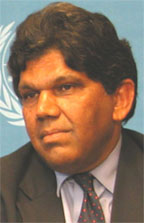Dr Bertrand Ramcharan, Ph.D. (LSE), Barrister-at-Law, is a former UN High Commissioner for Human Rights, Chancellor of the University of Guyana, Commissioner of the International Commission of Jurists, and Professor at the Geneva Graduate Institute of International and Development Studies. He is one of the founders of the newly established Guyana Institute of Public Policy, of which he is a Director. The Institute aims to generate thinking on issues that can help in the future cohesion and development of Guyana.
By Bertie Ramcharan

The University of Guyana has a new Chancellor and Vice-Chancellor and we welcome them both. Guyana deserves the best University it can support. As the previous Chancellor we saw the very best of the university in its graduating students. They overcame many hurdles in their quest for an education. So did their teachers!
These recommendations are offered publicly because they are of such a nature as to deserve public interest and attention. The University is somewhat hidden away from public scrutiny.
The first recommendation we would offer is that the Minister of Education should lay before Parliament each year a report on the progress of the University and Parliament should engage in an open debate of this report. That would raise the profile of the university and generate a national consensus on its future development.
The second recommendation is that the University Council should designate a public inspector of the university who would table an annual report on its administration and functioning. We make this recommendation because, while we were Chancellor, the Deans and professors came to us with simple requests: there was not enough seating in the class-rooms; there was no lectern on which to put lecture notes; there were few pieces of working equipment in the science laboratory; there were few computers in the computer room; and the library needed much more books.
These were not difficult issues to resolve and they may well have been resolved in the meantime. But a public inspector at the University, submitting an annual report, would bring issues such as these to the public’s attention and sharpen the performances of the responsible officials.
The third recommendation we would make is that Parliament should have a role in confirming members of the university council. It would be fair to say that this body has hardly been functioning. When it does meet it might be lucky to have a quorum. The level of magnanimity of its members was not spectacular and one often had the impression that the university deserved better. Political skirmishing was common-place. As Chancellor we often had to serve as peacemaker!
The fourth recommendation is that the position of the Pro-Chancellor should be revisited and probably abolished. This position was created at the outset of the university to help facilitate the Chancellorship of senior personalities who lent their prestige to the university but could not devote enough time to its day to day affairs. The Pro-Chancellorship, according to the Statute, is not a delegated position. In acting in the absence of the Chancellor the Pro-Chancellor acts as of right and, effectively, is the real head of the university. We do not make this comment as a reflection on anyone. We make it as a policy issue.
Usually, the Chancellor comes in for the Annual business meeting and for the annual graduation ceremonies. For the rest of the year, the university is in the hands of the Pro-Chancellor, acting in his own right and the Council may or may not meet. The Statute says that the Chancellor is the Head of the University. In practice, it is the Pro-Chancellor.
The fifth recommendation we would make is that if the position of Pro-Chancellor is retained it should not be held by a serving officer, not least by the senior information operative of the Government. For most of our Chancellorship the Pro-Chancellor served simultaneously as head of the Office of Information of the Government. We had the most cordial relations with the Pro-Chancellor. But, as we are counselled elsewhere, one cannot serve God and mammon at the same time! There were times when the voice of God spoke through the Pro-Chancellor!
The sixth recommendation we would make is that one should study the idea of reforming the university administration with a view to combining the positions of Chancellor and Vice-Chancellor into the position of President of the University. This is the model in many American colleges and, admittedly, departs from the Commonwealth experience to which we are accustomed. The reason for advocating a President of the University is that the institution needs a combination of an entrepreneur and an efficient administrator, who would go out into the Guyanese and the wider world and advocate and fund-raise for the university.
While we were Chancellor we met with representatives of the business community and we had the impression that there were assets to be tapped into but there were problems of confidence in the institution. A university President would have the responsibility to reach out to these and other communities.
The seventh recommendation we would make is that a modernised relationship agreement should be concluded with the University of the West Indies designed to draw upon the counsel and advice of our senior university institution in the Caribbean and help improve quality controls in the University of Guyana. A Parliamentary commission might be designated to look into this issue.
In conclusion, we would say that we offer these recommendations in a positive spirit and with every respect for all who have served and continue to serve our national university. The problems of the university, at the end of the day, are in Vlissengen Road and in Sophia. We would like to make a call to the high road on behalf of the university.





